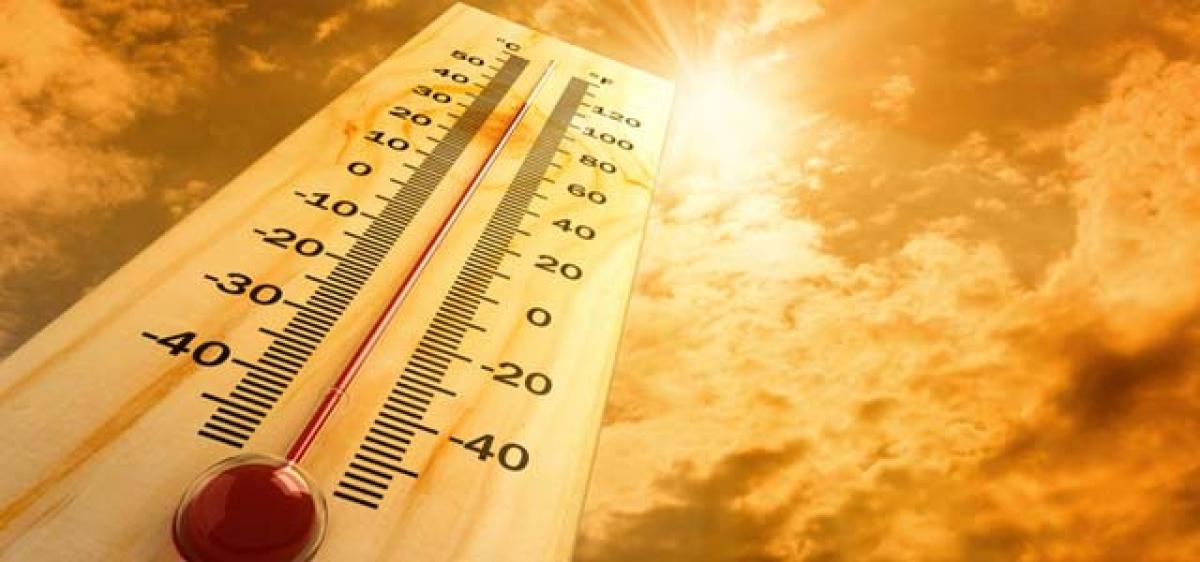Live
- CashKaro Founder Couple Swati & Rohan Bhargava Launch ‘BAD’ Podcast to Inspire India’s Next Generation of Dreamers
- Border-Gavaskar Trophy 2024-25: Australia’s assistant coach Daniel Vettori to miss first Test for IPL mega auction
- Maha polls: BJP’s ‘chota popat’ jibe in response to Congress ‘safe’ attack
- AM Green Kakinada Cluster Joins the World Economic Forum.
- 3 elephants electrocuted in Sambalpur
- Elevate Your Style: Handpicked Luxury Fashion & Accessories
- Ola Electric users continue to cry amid poor service, software glitches nationwide
- Panchayat Raj AE Panduranga Rao caught by ACB while taking a bribe of Rs 50,000.
- Leveraging Data and Analytics for Product Management Excellence: Mahesh Deshpande’s Approach
- Two vegetable varieties of Himachal varsity get national recognition
Just In

Several parts of Andhra Pradesh and Telangana are reeling under above normal temperatures. The Met officials predict hotter weather for a few more days. The condition may worsen in the peak summer, which warrants a proper plan of action to mitigate the sufferings of people from the scorching heat waves.
Several parts of Andhra Pradesh and Telangana are reeling under above normal temperatures. The Met officials predict hotter weather for a few more days. The condition may worsen in the peak summer, which warrants a proper plan of action to mitigate the sufferings of people from the scorching heat waves.
The National Disaster Management Authority (NDMA) defines a heat wave as a period of abnormally high temperatures, more than the normal maximum temperature that occurs during the summer season. The extreme temperatures and resultant atmospheric conditions adversely affect people living in these regions as they cause physiological stress, sometimes resulting even in death.
Higher daily peak temperatures and longer, more intense heat waves are becoming increasingly frequent due to climate change. The health impacts of heat waves typically involve dehydration, heat cramps, heat exhaustion and or heat stroke. People should take measures to minimise the impact during the heat wave and prevent serious ailment.
They include: Avoid going out in the sun, especially between 12 noon and 3 pm. Drink sufficient water and as often as possible, even if not thirsty. Wear lightweight, light-coloured, loose, and porous cotton clothes. Use protective gadgets. Avoid strenuous activities when the outside temperature is high. Avoid alcohol, tea, coffee and carbonated soft drinks, which dehydrate the body. Avoid high-protein food and do not eat stale food.
Fine, but, the economically deprived that are more vulnerable to such heat waves find it difficult to adhere to such do’s & dont's. The government should step in to ensure adequate protection to the vulnerable section of population from the devastating impact of heat disaster.
State and local authorities should prepare and implement a heat wave action plan to help protect their citizens from the extreme heat.
Map out the 'High Risk' communities and areas. Set up 'Public Cooling Places' to expand access to shaded areas. Temperature forecasts and heat alerts should be sent as bulk messages on mobile phones. Display such information on electronic screens at busy traffic intersections and market places.
Develop a mobile phone app that would not only provide heat alerts but also help users identify, via maps, heat shelters and drinking water availability along highways and city roads.
Recognise heat wave as a major health risk. Plan heat treatment wings in hospitals. Healthcare professionals should be equipped with capacity to recognise and respond to health-related illnesses during extreme heat events. Government agencies will have a critical role to play in preparing and responding to heat waves as severe and extended heat waves can also cause disruption to general, social and economic services.
Inter-departmental co-ordination is critical in this regard. Early warning systems should be developed to enhance the preparedness of decision-makers. Build temporary shelters wherever necessary. Improve water delivery systems in public places.
The heat waves may not be notified disasters. But, their debilitating impact on the lives of people especially on the poor and the vulnerable cannot be underestimated. The state and the civil society groups should work together to make citizens cope up with such extreme weather events.

© 2024 Hyderabad Media House Limited/The Hans India. All rights reserved. Powered by hocalwire.com







